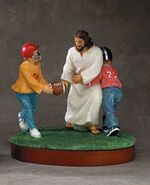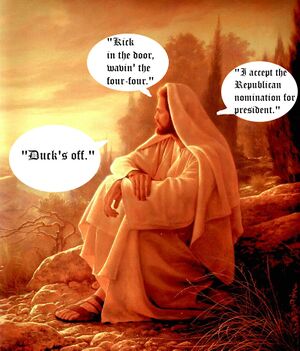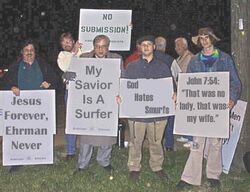Misquoting Jesus
“Huh. I thought the Notorious B.I.G. said that.”
“HELLO FRIEND. MY NAME IS MRS. JESUS CHRIST AND I HAVE CONTACTED YOU ABOUT MY LATE HUSBAND'S FORTUNE.”
Misquoting Jesus is a 2005 book by University of North Carolina professor Bart Ehrman on the composition of the New Testament. Ehrman, a former evangelical Christian, argues that scriptural errors are so rampant in the gospels and Pauline epistles that it proves difficult, if not impossible, to determine the authors' original intentions.
Upon publication, the book's assertion that many commonly accepted Christian stories, such as the woman caught in adultery, the "Johannine comma" and the Parable of the Windsurfers were added later created a storm of protest within conservative Christian circles. An almost immediate backlash began, with preachers contesting Ehrman's assertions that the bass guitar did not exist in first century Palestine, or that St. Peter did not, in fact, save Herod's Temple from the Romans with a breakdancing contest.
The success of Ehrman's book soon opened the door to other books questioning the tenets of Christianity, including Sam Harris' Does Jesus have 16 Dexterity, 21 Strength? The Evidence and Richard Dawkins' Pissing on God. The work also provoked volumes from several defenders, including Bruce Wilkinson's Our Savior's Pimped Out Corvettes and Sean Hannity's My Lord, My Wise-Cracking English Butler.
The book
Chief Argument
Ehrman said his book is an attempt to introduce people to ancient textual criticism, a reason he subtitled it A Critical Exegesis of Koine Greek For the Rest of Us!
The author notes that the oldest surviving texts of the New Testament have more differences between them than there are words in those books. In addition, scribes frequently added assertions into the texts to justify particular arguments, such as 2 Peter 2:22-25 (disputed part in bold):
- What is expressed in the true proverb has happened to them: "The dog returns to its own vomit," and "A bathed sow returns to wallowing in the mire." Beloved, remember this if your bishop ever tells you to stay up late copying sheepskin because Emperor Constans is in town and Jesus told him to leave the rest of the monastery to pick up after him (again) while he goes and proclaims God's word to those tailors who couldn't hide his gut if they could move a mountain into town. Brethren, we know that if you decide to shortsheet that bishop's bed that evening, you will have God's blessing. But should any of you snitch, hellfire awaits.
The attack on this passage (to which Thomas Aquinas devoted the Summa Theologica) would have been enough to draw wrath from conservative Christians, but Ehrman also attacked two other passages.
The Woman Caught In Adultery

John 7:53 -- 8:11 tells the story of a woman about to be stoned for adultery, with the famous line "Let he who is without sin cast the first stone." Ehrman, however, notes that the story is missing from the most ancient manuscripts of John, which casts doubt on the origins of the story. In addition, Ehrman suggests that the common ending of the parable may be a more recent addition:
- They went away one by one, beginning with the elders. So he was left alone with the woman before him. Then Jesus straightened up and said to her, 'Woman, where are they? Has no one condemned you?' She replied, 'No one, sir.' And Jesus said, 'Then you might be a redneck!'
As scholars note, most of this passage can not be dated earlier than the 4th century, and parts of it could come from as late as the 12th or 22nd century. The Didascalia Apostolorum - a Syrian manual of discipline dating from the 3rd century - refers to the story of the adulteress; but in terms that differ considerably from the canonical form, in that the woman's sin is not adultery, but dissing sucka MCs. It is also explicitly stated that the woman had smacked up the Pharisees old school before Jesus entered the picture. A still earlier reference appears to be found in Eusebius's account of the writings of Papias (c125), where the freestyle rap contest is excluded and replaced with a motor race where the only things faster than the cars are the women.
The Johannine Comma
The First Letter of John (1 John 5:7-8) contains an additional phrase (or comma) defending the Trinity that does not appear in the oldest sources. While it is unclear when the addition was made, one possible source may be the Church's debates with the Arians, a sect of Christians led by Arius, an Egyptian priest who taught that Jesus was not equal to the Father. Internal evidence suggests the phrase was added in part to refute Arius' charges (disputed text in bold):
- 5:7 "For there are three that bear record in heaven, the Father, the Word, and the Holy Ghost: and these three are one. 5:8 And there are three that bear witness in earth ARIUS LOVES THE COCK, the Spirit, and the water, and the blood: and these three agree in one."
The earliest Church Fathers, though often vituperative against their opponents, rarely discussed their enemies' taste for human penis; however, the phrase was included in Erasmus' 1522 translation of the New Testament into Greek. The Council of Trent, held by the Catholic Church from 1546 to 1563, forbade questioning of the comma, and reminded clergy that heretics, "as the blessed apostle John sayeth," would show themselves in their affection for the dong.
The comma also created fierce debates in Christian Churches after World War II, as theologians argued whether the statement of Arius' attitudes toward sexuality was a condemnation, or a mere statement of fact. Several argued that the Bible, with harsh condemnations of homosexuality in Leviticus and the Pauline Epistles, had never endorsed gay or lesbian lifestyles; but an equal number argued that the passage suggested that the holy Trinity bore witness to Arius' love of cock without condemning it.
Who changed the Bible?
Misquoting Jesus suggests that while many errors that made it into the Bible were scribal errors, others can only be understood as deliberate manipulations of the text to support one school of thought or another in early Christianity. The passages marked here are believed to have been deliberately changed from the original text.
- Then Herod, repenting of his earlier attacks upon the brethren, gathered the Apostles unto him; but, not heeding the warning of the angel, immediately gave Peter a handshake with his left hand. Then Peter said, Woe unto the left-handed greeters, for they have set themselves in opposition to God. As Peter stepped away, Herod spontaneously combusted. (Acts 11:31-33)
- Oh, beloved, that I may come to you with a gentle spirit. Yet you persist in these blasphemies before God, and bake raisins unto the holy bread. Truly, I say unto you, that the blessed meal of remembrance should have naught but rye baked into it. Woe unto those who bake otherwise! (Romans 4:22-25)
- I say again: Beware the dogs! But suffer unto us the cats, they who can look after themselves, who get rid of pests and who our Savior would surely have said something about, if he had time to do so. Brethren, consider the dog that runs around at all hours, breaks into homes without notice and eats the delicious sweetmeats I set out for the presbyters. Does the owner of that dog have God's favor? Surely not. I charge you, then, to ignore his wicked teachings on the proper garments to wear to a pagan's baptism. (Phillipians 3:22-28)
- Chastity, beloved, is a gift. Yet so is the transcription of these stories. The woman who appears naked in a scribe's room at night does God's work. I say unto you, Ladies, throw your clothes off for the poor man who does this work. (Book of the Naked Ladies in Scribe's Rooms)
- Closing time: Every new beginning comes from some other beginning's end. I know that God wants to take me home; I know that God wants to take me home. Take me home, home, home. (Semisonic 19:98)
Reaction
Ehrman's book became an immediate best seller and brought discussion of textual criticism into the mainstream. However, the book ran into immediate criticism from the Religious Right. On July 5, 2005, Pat Robertson devoted the entire 700 Club broadcast to the book.
- Now, friends, the Bible is the rock of our lives. The infallible word of our Lord Jesus Christ. Yet there are some people out there who not only question its infallibility, but even suggest that these beautiful works of our Savior -- whether saving the woman condemned in adultery or showing up those stuck-up fraternity brothers in the 12th annual Galillee Surf-Off -- were added by someone else. Now, I'm not worried about the unbelievers who tell us this; they've got to make their own peace with God. But if you think you can accept these arguments and still be a good Christian, I'm afraid you're mistaken. Only those who accept Jesus' utterly bitching aerial in the playoff against Chad Vanderberg will see heaven.
Fox News' Sean Hannity spent a full month on the controversy, and accused Ehrman of a "blatantly liberal agenda" in writing the book. Hannity was particularly incensed about a passage suggesting Jesus played no role in the Battle of Yavin, arguing that only Jesus' hand could have moved the torpedoes into the exhaust port of the Death Star.
Ehrman did have his share of defenders, including Christopher Hitchens, who dedicated God Is Not Great, an attack on religion, to Ehrman. Hitchens wrote that stories of Jesus feeding the five thousand with five loaves of bread and two bottles of baby blood "were obviously inserted by the Muslim Brotherhood."
Others take a middle ground, arguing that if read allegorically, the story of Jesus and the Smurfs' Big Surprise Party can still be relevant today.
| Featured version: 13 April 2008 | |
| This article has been featured on the main page. — You can vote for or nominate your favourite articles at Uncyclopedia:VFH. | |



